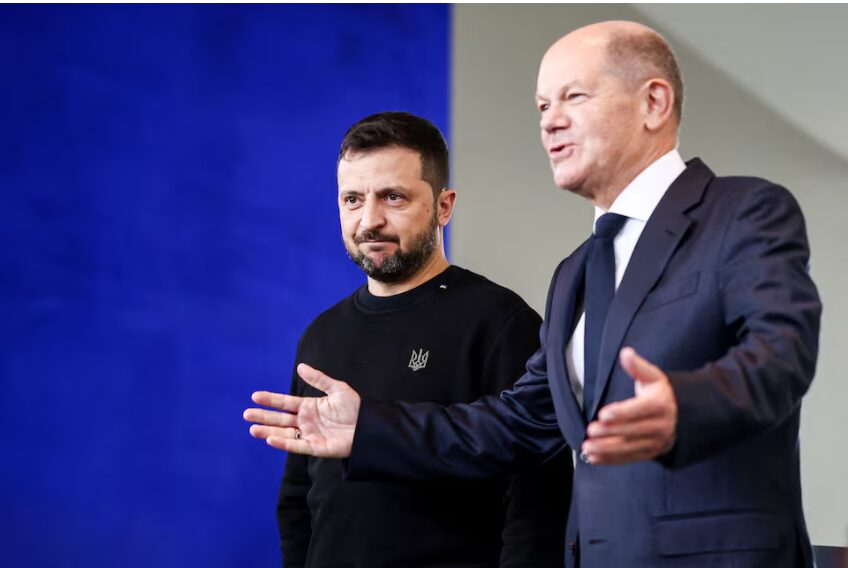It’s a well-observed pattern that Germany often sets the course for other European nations to follow. This was evident during the 2015 refugee crisis and again with the Russian sanctions following the 2022 War in Ukraine. Now, Germany has made another significant move, one that seems likely to trigger a domino effect across Europe – a domino effect that has caused panic in Kyiv.
Ukrainian President Volodymyr Zelensky has strongly condemned the recent communication between German Chancellor Scholz and Russia’s Putin, describing it as opening a dangerous “Pandora’s box” that could compromise the international strategy of isolating Moscow.
Expressing his concerns, Zelensky stated: “This plays directly into Putin’s long-term strategy. His primary goal is to break free from isolation and engage in diplomatic discussions that will yield no concrete results,” referring to the conversation between Scholz and the Russian leader. Quite a direct attack on Germany isn’t it?
The German Chancellor Olaf Scholz dialed Putin after two long years, marking the first Putin-Scholz dialogue in two years amid significant political developments in Germany and broader international policy shifts regarding the Ukraine war.
INSIDE THE TALKS BETWEEN SCHOLZ & PUTIN
German Chancellor Olaf Scholz and Russian President Vladimir Putin held an hour-long phone conversation on Friday, their first dialogue in two years, according to government spokesman Steffen Hebestreit.
During the call, Scholz urged Putin to pursue a “just and lasting” peace with Ukraine, and Putin justified his war by claiming that there are some ‘territorial realities’. Germany also expressed concern about North Korea’s potential military involvement in the conflict.
Before speaking with Putin, Scholz had consulted with Ukrainian President Zelensky. The Ukrainian leadership had outrageously objected to any talk between Berlin and Moscow. Surprisingly, this was for the first time that Germany defied the demand of Ukraine.
The German chancellor reaffirmed his country’s unwavering support for Ukraine’s defense efforts, yet he indicated that the time is now ripe for peace talks to commence. According to government sources, Scholz emphasized Germany’s commitment to backing Ukraine “for as long as necessary.”
THE CONCERN OF ZELENSKY & KYIV
Zelensky has condemned Germany’s diplomatic outreach to Russia, labeling it a ‘Pandora’s box’ that threatens Ukraine’s international support. And of course, his concerns aren’t unfounded, given the challenging times facing Ukrainian leadership.
First of all, he lost Joe Biden, his closest friend in the White House. The political landscapes in the United States are changing, and leadership transitions could have a big impact on future assistance for Ukraine’s defense initiatives. Donald Trump is a well-known figure opposing war against Russia.
Donald Trump, the president-elect of the United States has clearly stated that he will end the Ukraine war in 24 hours, a statement clearly showing Trump’s willingness to end the Ukraine war.
In addition, vice president-elect JD Vance controversially suggested during the campaign that the best way to end the war was for Ukraine to give up the territory that Russia had taken, create a demilitarized zone, and become neutral—that is, not join NATO.
Zelensky harshly criticized him, claiming that he is just too radical. However, that was during the campaign. Now, its action time.
Trump’s return to power will undoubtedly have an impact on all of NATO’s allies as well. It is probable that the policies are set to undergo massive shifts.
SCHOLZ’S 180-DEGREE TURN: TRUMP & ELECTIONS
And this is probably why Olaf Scholz has also started to suddenly change his gears. From being a total critique and calling for Russian withdrawal to urging Putin to start peace talks. Olaf Scholz has now come a long way. Indeed the return of Donald Trump is a major factor.
But, the recent political developments in Germany are also a major driving factor behind Berlin’s change of heart. Recent developments have created complex challenges for Chancellor Scholz.
The ‘traffic signal’ coalition’s stability was compromised when Finance Minister Lindner raised concerns about balancing German domestic interests with Ukraine support.
The coalition’s subsequent breakdown has led to snap elections, amid growing public debate about the economic impact due to Berlin’s relentless support for Ukraine in the ongoing war. Olaf Scholz-led SPD may lose in the next elections due to the Ukraine war.
So, all in all, Scholz faces a delicate balancing act: managing domestic economic concerns while maintaining Germany’s international commitments.
This shift in German policy will indeed influence broader European approaches, potentially affecting the level and nature of support that Ukraine has received over the past two years. And so, Zelensky’s concern do make a sense here.
